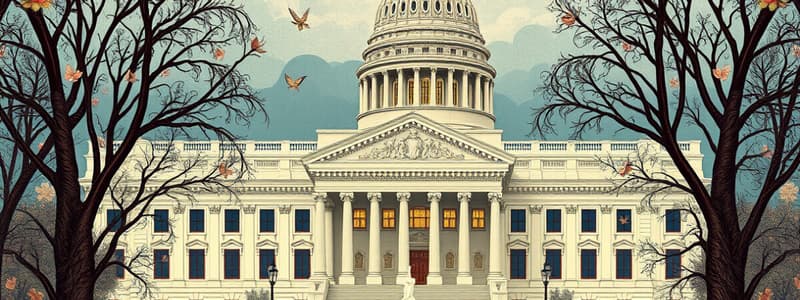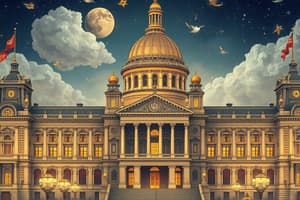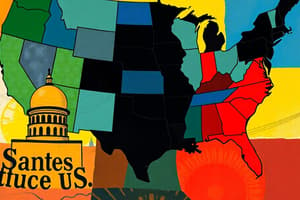Podcast
Questions and Answers
Name four powers that belong to the federal government under the Constitution.
Name four powers that belong to the federal government under the Constitution.
Print money, declare war, create an army, make treaties
What was the 50th state to be added to the United States?
What was the 50th state to be added to the United States?
Hawaii
What is the head executive of a city government called?
What is the head executive of a city government called?
The Mayor
What are four rights or freedoms guaranteed by the First Amendment?
What are four rights or freedoms guaranteed by the First Amendment?
What were the 13 original states of the United States called before they were states?
What were the 13 original states of the United States called before they were states?
What is freedom of religion?
What is freedom of religion?
What stops one branch of government from becoming too powerful?
What stops one branch of government from becoming too powerful?
What is the 'rule of law'?
What is the 'rule of law'?
What is the economic system in the United States?
What is the economic system in the United States?
What does the President's Cabinet do?
What does the President's Cabinet do?
Flashcards are hidden until you start studying
Study Notes
Federal Powers
- The federal government has specific powers under the Constitution, including the ability to print money, declare war, create an army, and make treaties.
50th State
- Hawaii is the 50th state added to the United States, joining the Union on August 21, 1959. It is the only U.S. state comprised entirely of islands and is located in the Central Pacific Ocean.
City Government Leadership
- The head executive of a city government is known as the Mayor.
First Amendment Rights
- The First Amendment guarantees several rights and freedoms, including:
- Freedom of Speech
- Freedom of Religion
- Freedom of Assembly
- Freedom of the Press
- Freedom to Petition the Government
Original States
- Before attaining statehood, the original 13 states were referred to as colonies. These included:
- Virginia, Massachusetts, New Hampshire, Maryland, Rhode Island, Connecticut, North Carolina, South Carolina, New York, New Jersey, Pennsylvania, Delaware, and Georgia.
Freedom of Religion
- Freedom of religion allows individuals to practice any religion or to forgo religious practice altogether.
Checks and Balances
- The system of checks and balances, combined with the separation of powers, is designed to prevent any single branch of government from becoming too powerful. Key points include:
- The Executive branch can veto legislation and nominate Supreme Court justices.
- The Legislative branch can override a veto, impeach officials, and refuse appointments.
- The Judicial branch has the authority to overturn legislation deemed unconstitutional and presides over impeachments.
- Citizens can vote and influence government decisions, while a free press holds branches accountable to the public.
Rule of Law
- The rule of law dictates that:
- Everyone must adhere to the law.
- Leaders are not above the law.
- The government is bound by the law.
Economic System
- The United States operates under a capitalist economy characterized by:
- Largely private ownership.
- Market forces determining the allocation of goods and resources, leading to price establishment through supply and demand.
President's Cabinet Role
- The President's Cabinet serves to advise the President on various issues facing the administration.
Studying That Suits You
Use AI to generate personalized quizzes and flashcards to suit your learning preferences.




